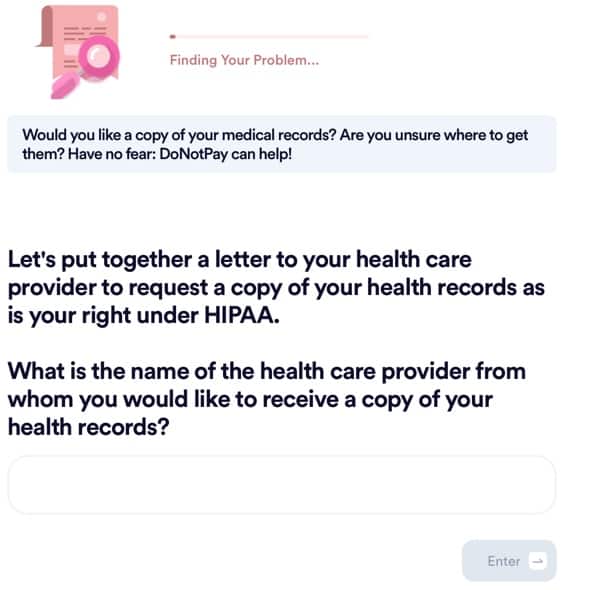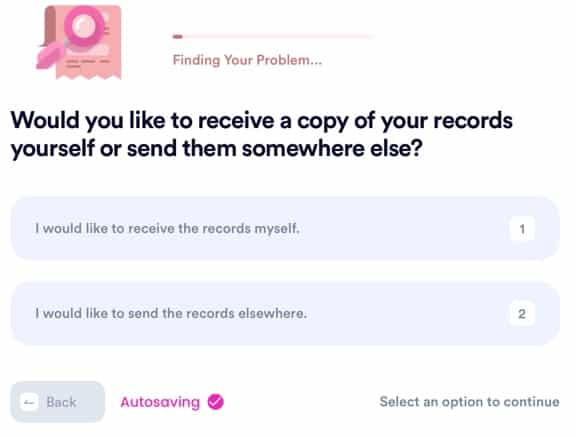How You Can Transfer Your Medical Records Between Doctors
Your doctor needs to have your medical records. This is a simple fact of life. In order to know your medical history and prescribe the right treatments, they need your full medical records. From childhood illnesses to past surgeries, this is important information for your doctor to have. When you change doctors, your new doctor will need to be equally well-informed. This means .
How do you transfer medical records to a new doctor? The process mainly involves getting ahold of your current medical record files, a process that is not always as easy as it should be. DoNotPay can help you get your medical records and transfer them between doctors.
How Much Does It Cost to Obtain Medical Records?
Many healthcare providers charge a fee for providing medical records. Hard copies, printed or on CDs, are provided at cost. Several states have passed laws limiting the among that health providers can charge for medical record release. If the standard fee for medical records is too high, your right to your records may qualify you for a fee waiver.
The cost of your medical records will depend on your state, provider policies, and the size of your record. Most states allow providers to charge by the page in addition to a search fee. Several states require portions of your medical records to be provided for free to prove medical eligibility for programs or claims.
What Types of Medical Records are Restricted from Being Released?
- Mental health
- Sexual health
- Substance abuse
- Minor records
- Violence history
- Newsworthy records
Restricted medical records are those that would be considered especially private. History of mental illness or substance problems might be protected beyond the usual medical record sharing protocols. You will need to give special and specific permission to have these records released - even if you are releasing them to yourself.
How to Transfer Medical Records Between Doctors
| Ask Your Previous Doctor to Transfer Them | Sometimes, you can simply ask your doctor to send your along to a new provider. This is most typical when your new doctor is inside the same healthcare system - and that healthcare system has modern records management software. If so, then your doctor can simply send over a digital copy of your files. If release forms are needed, you might even sign an iPad and get it all done in one visit.
Of course, these opportunities are rare. |
| Seek Digital Medical Records | If you're lucky, your medical provider has a patient portal where you can easily release your medical records to yourself and download a digital copy. This is often much more affordable than typical records requests - as there is no cost associated with printing and binding your records. |
| Request a Hard Copy of Your Medical Records | If there are no easy digital answers, you'll need to request a hard copy of your medical records from your medical provider's records department. There is usually a complex form to fill out and there is often a per-page printing fee. Most medical centers allow you to request your records on-site and a few even grant them same-day. Some, however, require you to print, fill, and mail your request for medical records. |
| Make a Copy for Yourself | If and when your medical records are finally granted, make yourself a copy to keep for your personal files. These are useful to know your medical history, check details, and in case of a medical emergency. You also won't have to fight to get all older medical records again. |
| Submit the Medical Records to Your New Doctor | Finally, you can take a copy of your medical records to the office of your new doctor. Their admin staff should know what to do with your records and they might even scan them into digital form. |
How to Transfer Your Medical Records with the Help of DoNotPay
Is your previous medical provider being difficult with your medical records? Getting your medical records transferred or released is not always as easy as it should be. Red tape and exorbitant fees stand between you and an easy transition to a new medical provider. DoNotPay can help. We're great at cutting the red tape when bureaucracy gets in the way.
Just let us know where your medical records along with the answers to a few questions and we'll draft the demand letter. You have a right to your medical records. DoNotPay will help you get a copy so you can keep a personal record and
How to Request Medical Records Using DoNotPay:
DoNotPay has seen these requests before and knows how to write your health care provider a simple, clear, and effective letter that will get your legally-guaranteed health records for you in no time.
- Look up medical records on DoNotPay's website.

- Enter the name of the health care provider you'd like to receive medical records from.

- Answer a few questions about your provider and where you'd like to send the records.

DoNotPay Can Help With Medical Records Anywhere in the Us
- Medical Records Release Form
- How to Request Medical Records
- How to Get My Medical Records
- Kaiser Medical Records
- Electronic Health Records
- Medical-Records
- Cleveland Clinic Medical Records
- How Long are Medical Records Kept?
- Mercy Medical Records
- Baptist Medical Records
What Else Can DoNotPay Do?
DoNotPay can help you in more ways than formally requesting your medical records. Our services were built on making life easier and cutting the red tape. Here are just a few more online tools and services that might be useful to you this year.
- Advance Health Care Directive
- Submit a Request for Sick Leave
- Get Birth Certificate Copies
- Create a Power of Attorney
- Compensation for Victims of Crime
- Death Certificates
- File a Complaint Against Any Company
- Online Fax
- Release of Liability
- Request Jury Duty Leave


